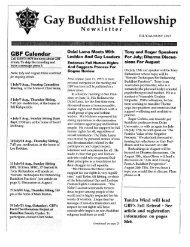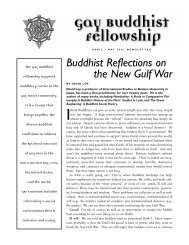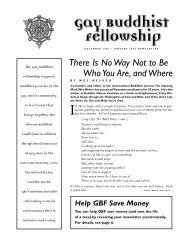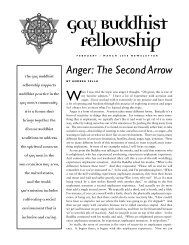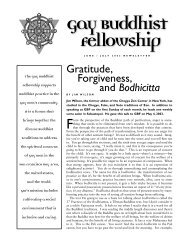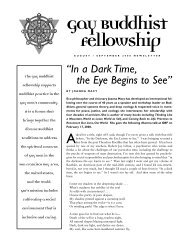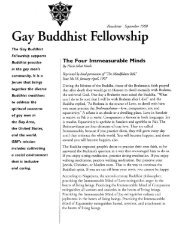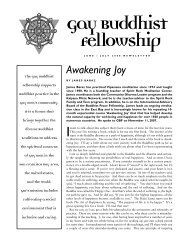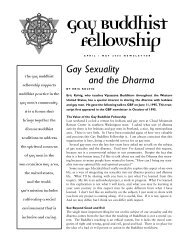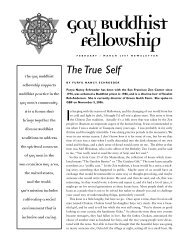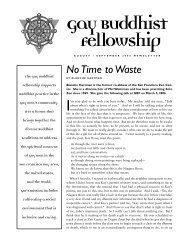2012.04 David Lewis (On Dukkha and Sukha).pdf - Gay Buddhist ...
2012.04 David Lewis (On Dukkha and Sukha).pdf - Gay Buddhist ...
2012.04 David Lewis (On Dukkha and Sukha).pdf - Gay Buddhist ...
You also want an ePaper? Increase the reach of your titles
YUMPU automatically turns print PDFs into web optimized ePapers that Google loves.
<strong>On</strong>e of the ways that that theBuddha’s psychology was differentfrom Western psychology isthat the Buddha saw that therewas dukkha in the world, in ourlives, dukkha being dissatisfaction.It’s often translated as suffering,which I don’t think is avery good translation. <strong>Dukkha</strong> isdissatisfaction, wanting things tobe other than they are. But theBuddha also taught that there issukha. The opposite of dukkha issukha. <strong>Sukha</strong> is happiness.think is a very good translation. <strong>Dukkha</strong> is dissatisfaction,wanting things to be other than they are. But the Buddhaalso taught that there is sukha. The opposite of dukkha issukha. <strong>Sukha</strong> is happiness.So our lives are this balance of dukkha <strong>and</strong> sukha. Everythingwe do <strong>and</strong> every moment of our day is some balanceof dukkha <strong>and</strong> sukha, <strong>and</strong> it’s not like we can get rid of all thedukkha in our lives <strong>and</strong> just have sukha, which is a lovelythought. Nor can we only live in dukkha. Sometimes whenthings aren’t going well, we can be okay with that. So forthe Buddha <strong>and</strong> the Buddha’s teaching, happiness is a fundamentalcondition. It’s something that is part of our Buddhanature, according to the Mahayana tradition. It’s somethingthat you all have right now. It always exists; it’s justcovered up. So getting at tranquility <strong>and</strong> sukha, happiness inyour life, is a matter of uncovering. Happiness comes fromsukha, <strong>and</strong> sukha comes from acceptance of the moment as itis. A gratitude for the moment as it is, even if the momentis not perfect. In the West, we tend to think of happiness assomething that needs to be pursued or gotten. In the West,we tend to view our dukkha, our dissatisfaction, as somethingthat’s missing. There’s a sense of lack. And in order totransform that dukkha, that dissatisfaction, into sukha, intohappiness, we need to go get something: we need to getpossessions, we need to find the right relationship, the rightjob, the right apartment, whatever we need to change tomake things better. And the Buddha really tried to steer usaway from that idea, that happiness is someplace other thanwhere we are.The relentless pursuit of happiness that we all do in oureveryday lives takes two different forms in terms of our activity.<strong>On</strong>e is looking for pleasure, looking for the thing, theperson, the job, the activity that’s going to make us feel better,<strong>and</strong> the other is turning away from our dukkha, turningaway from whatever is making us uncomfortable. It couldbe that we’re turning away from really big issues, like relationships<strong>and</strong> jobs, or it could be really small things. I did aretreat with a group of Theravada monks earlier this spring.<strong>On</strong>e of the monks just delighted me by providing an example<strong>and</strong> a definition of dukkha which just resonated for me.This monk said, “<strong>Dukkha</strong> is dirty glasses.” For those of youwho wear glasses, you all know that all of a sudden you noticethere’s a smudge on your glasses, <strong>and</strong> you might nothave a h<strong>and</strong>kerchief or something to wipe it off, but as soonas you notice it, it drives you nuts until you fix it. Chancesare you’ve been sitting around for half a day with thatsmudge on your glasses, <strong>and</strong> it’s been okay until you noticedit. That’s dukkha. Our lives are full of dukkha. So when theBuddha taught that dukkha is a condition of life, he’s notsaying we’re all miserable all the time, or that we’re all sufferingall the time—that terrible word, suffering—it’s justthat one thing after another that needs to be fixed, orchanged or altered. And our efforts at fixing, changing oraltering dukkha so that we get some sukha or at least somerelief, take the form of what the Buddha called craving: “Iwant things to be different; I want more of this; I want lessof that.” So this constant cycle of noticing things are a littlebit wrong—dirty glasses, bad job, unsatisfactory relationship—<strong>and</strong>trying to either turn away from it or grab somethingthat’s better, is what’s called samsara. It’s the wheel ofsuffering that we’re all on, that we’re running on like hamstersfor our entire lives. And the Buddha’s teaching, theBuddha’s path, is how to get off the wheel of samsara, howto step off the wheel.Which is easier said than done, for those of you who havea practice or have even thought about it <strong>and</strong> tried to do it,because a lot of those activities that we’ve come up withover the course of our lives to turn away from our dukkha, orto find sukha, don’t really serve us well. Sometimes they justadd to our dukkha, add to our dissatisfaction. And the factthat we’re always looking, that this craving is always cravingsomething different—this craving for change is always present—leadsto a whole set of behaviors that can becomeaddictive. I actually think we all have addictions of some2 G B F A P R I L / M AY 2 0 1 2 N E W S L E T T E R



